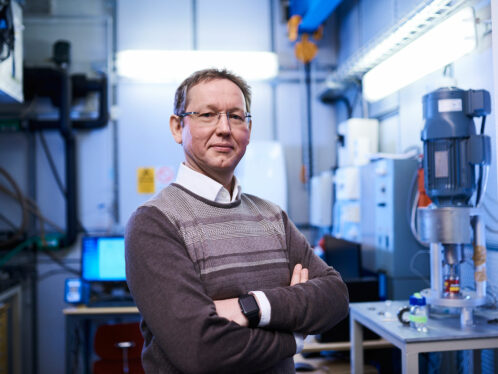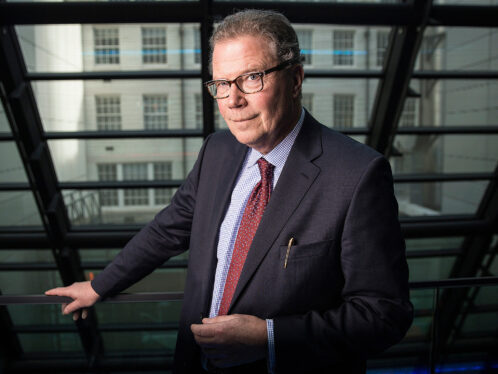
Trend tracker
Consultant Ian Kershaw helps the automotive industry’s best and brightest meet the challenges of the future.
When pressure increases on the global automotive industry to make a profit while investing in technology that reduces environmental impact, it is good to have someone like Ian Kershaw on board. Kershaw’s job as managing director of Ricardo Strategic Consulting, RSC, Northern Europe, is to help companies maintain healthy, profitable and competitive businesses. Increasingly, this means incorporating sustainable technology and production processes. Ricardo is one of the world’s most innovative engineering groups, working at the cutting edge of automotive technology. Thus, Kershaw and his team at RSC have a unique perspective on the issues and trends prevailing in the industry. RSC’s area of expertise is broad. The consulting company helps the biggest names in the automotive industry implement management and technology to improve their profitability and competitiveness. It works with mergers and acquisitions, and it advises government institutions and private equity firms on future trends that have implications for the transport sector and beyond. Kershaw is passionate about his work and the automotive industry in general. “It’s a real buzz to work with ferociously bright and talented people,” says Kershaw. In his eight years at Ricardo, RSC has grown to comprise more than 60 consultants, with a presence in China, the Czech Republic, Germany, India, Italy, Japan, Korea, Russia, the United Kingdom and the United States. In addition, the company can tap into the skills of more than 1,300 Ricardo engineers for any project it undertakes. Kershaw joined Ricardo in early 2004, to help build the new consultancy business. Previously, he had spent several years with blue-chip global strategy consultancies and management roles in research and development, manufacturing and finance in the automotive industry. His education and background are in engineering and management, with an MA from Cambridge University and an MBA from Cranfield University in the United Kingdom. Now, after eight years in his role at RSC, Kershaw says he likes the fast-paced environment of consulting, trying to predict both the long-term trends that will drive mobility and the solutions that will support sustainable growth. While there is a consensus that sustainable transport or mobility is the general goal, how that is achieved and what drives that aim varies between countries and the priorities, both social and political, set within different societies. “In Europe, it means lowering carbon dioxide emissions,” Kershaw says. “In the US, it relates to energy security and cutting urban pollution. China wants to control pollution but not by sacrificing economic prosperity and employment.” While governments and politicians around the world are hoping for a magic solution that will keep the world moving in a sustainable manner, Kershaw says, it will be a broad range of smart technology, products and processes that will lead the way. What he sees is a raft of innovations that will contribute to the whole. “We are looking forward 30 years to what may happen,” says Kershaw. This means considering how the automotive industry will develop not only in industrialized countries but also the BRICs (Brazil, Russia, India and China) and the newly dubbed “next 11” – countries such as South Korea, Turkey, Mexico and Indonesia that are experiencing rapid industrial growth. “Finding the right path to sustainable mobility is different for every country,” he says, adding that every country is interested in more sustainable, safer transport that will consume less fossil fuel. Indeed, a Ricardo study predicts that demand for oil may well peak before 2020 and then fall back to levels significantly below 2010 demand by 2035. The report states: “Evolutionary changes in automotive technology are predicted to bring revolutionary changes in gasoline demand.” There is increasing disparity of demand between fuel types; diesel volumes are buoyed by heavy-duty transport as gasoline declines due to increasing powertrain efficiencies and higher pump blends of bio-ethanol. But, notes Kershaw, “while the trend is towards more electrification of vehicles, some 85 percent of vehicles in 2030 will still use gasoline, diesel, natural gas and biofuel blends.” The combustion engine is, and will continue to be, a cost-effective method of propelling vehicles, he says. Advances in more efficient, smaller, lighter engines, coupled with the use of smart electronics, turbocharging technology, increased use of electric motors, hybridization, electrical ancillaries, advanced materials and other fuel-saving technologies will more than offset the rise in fuel demand deriving from the increase in the number of vehicles. Plus, the growth of biofuel derived from more sustainable sources will have an impact in the longer term, as companies improve production processes. That isn’t to say that new technologies such as battery-powered electric vehicles, fuel cells and hydrogen-powered cars won’t have their place in sustainable transport in the longer term, provided that the technical and cost hurdles can be overcome, Kershaw says. The social attitudes and infrastructure investments to support electrification and alternative fuels will also determine how slowly or quickly such technology is adopted. How transport is managed on the road will also have an impact on sustainable mobility, he says. “The use of information technology for congestion management and safety will lead to improved fuel economy,” Kershaw explains. He adds that many people are starting to change their behaviour and reduce their use of private transport. “The Internet has been a key enabler in this respect,” he says. “My annual car mileage has reduced from 32,000 kilometres eight years ago to 21,000 kilometres today. “People will have different cars for different reasons,” Kershaw continues. “People will pay in different ways for car transport. We may already be witnessing the demise of the general-purpose car.” The emergence of pay-per-month schemes for car use and paying only when you need personal transport are just two examples of innovative transport solutions. Kershaw says that ever-tightening emission legislation will continue to stimulate automotive companies to innovate. With companies maintaining their research and development budgets despite the economic climate, Kershaw sees continued opportunities for the development of good products and technology that can make important contributions to a better mobile world.




